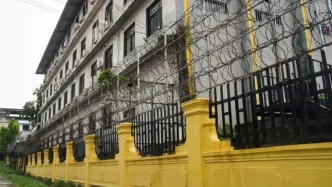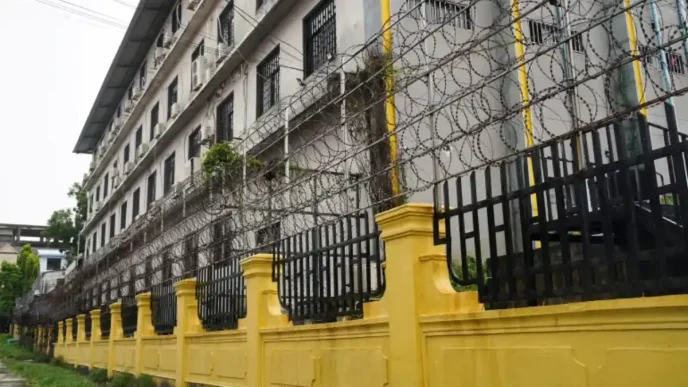In a significant step towards curbing the social and criminal fallout associated with Philippine Offshore Gaming Operators (POGOs), the House of Representatives has approved a bill to institutionalise a ban on these entities on its second reading. House Bill No. 10987, a consolidation of five related proposals, passed via voice voting on Monday, marking a legislative push to codify a prohibition that President Ferdinand “Bongbong” R. Marcos Jr. first declared during his State of the Nation Address (SONA) in July 2024. If enacted, the bill would outlaw the operation and offering of offshore gaming services, alongside related activities, in a bid to address the myriad issues tied to the industry.
The approval comes amid mounting concerns over the social costs of POGOs, which have been linked to a range of illegal activities, including kidnapping, human trafficking, prostitution, illegal detention, and even arbitrary killings. Over the past few years, high-profile raids on POGO hubs in areas like Porac, Pampanga, and Bamban, Tarlac, have exposed the dark underbelly of an industry that once promised economic benefits through job creation and foreign investment. Now, as the Philippines grapples with the fallout, the legislative move signals a broader reckoning with the unintended consequences of unchecked offshore gaming.
A Presidential Directive Turned Legislative Action
President Marcos’ announcement during his third SONA last year was unequivocal: all POGOs were to be banned due to their detrimental impact on Philippine society. “The social costs far outweigh any economic benefits,” Marcos stated at the time, reflecting a growing consensus among policymakers and the public alike (Philippine Daily Inquirer, 23 July 2024). His declaration, while not legally binding at the time, set the stage for legislative action, prompting lawmakers to fast-track bills that would enshrine the ban in law.
The approval of House Bill No. 10987 on second reading, just over two months after the House Committee on Games and Amusements endorsed the committee report, demonstrates a rare unity among legislators on an issue that has polarised opinion in the past. While some had previously argued that POGOs contributed to the economy through taxes and employment, the tide has turned decisively against the industry as evidence of criminality has mounted. Speaker Ferdinand Martin Romualdez, a key figure in the House, has himself underscored the need to investigate the illegal activities surrounding POGOs, even after Marcos’ ban declaration, highlighting the complexity of dismantling an industry deeply embedded in certain regions.
Ongoing Investigations and Calls for Accountability
Despite the presidential directive and the legislative progress, the road to eradicating POGOs and their associated ills is far from straightforward. Representatives such as Surigao del Norte 2nd District Rep. Robert Ace Barbers and Leyte 4th District Rep. Richard Gomez have insisted that investigations into illegal activities linked to POGOs must continue. “There is a need to seek accountability from those behind these possible crimes,” Barbers noted in the wake of Marcos’ SONA, pointing to the systemic nature of the problem (Philippine Daily Inquirer, 24 July 2024).
These investigations have taken on added urgency given the findings of the House’s quad committee, which has probed not only POGO-related crimes but also issues like extrajudicial killings from the previous administration’s drug war and the broader illicit drug trade. The overlap between these issues suggests that POGOs are not merely an isolated problem but part of a larger web of criminal networks that exploit regulatory gaps and weak enforcement mechanisms. Raids on POGO hubs have uncovered harrowing stories of exploitation, with workers—often foreign nationals—subjected to inhumane conditions and coerced into illegal activities.
The Social Cost of POGOs: A National Concern
The social ramifications of POGOs have become a national concern, transcending economic arguments in favour of the industry. Reports of kidnapping and human trafficking linked to POGO operations have shocked the public, with cases in Porac and Bamban revealing the extent to which these hubs operate as enclaves of lawlessness. In some instances, local authorities have been accused of complicity, raising questions about governance and corruption at the municipal level. While no definitive evidence has confirmed widespread official involvement, the scale of the operations uncovered during raids suggests that oversight has been, at best, inadequate.
Beyond the immediate criminal activities, POGOs have also been blamed for contributing to social decay in host communities. Property values in areas with POGO hubs have reportedly fluctuated wildly, while local businesses catering to the influx of foreign workers have sometimes displaced traditional livelihoods. Moreover, the presence of POGOs has strained community relations, with cultural and linguistic barriers exacerbating tensions between locals and the largely foreign workforce employed by these operators.
If the ban is fully enacted, it may help mitigate some of these issues, though experts caution that the underground nature of criminal networks could drive activities further into the shadows. “A legal ban is a start, but enforcement will be key,” noted a Manila-based criminologist who has studied the POGO phenomenon. “Without robust mechanisms to monitor and dismantle these networks, we may see them resurface under different guises.” This conditional concern underscores the challenges ahead, even as the legislative process moves forward.
Economic Implications: A Double-Edged Sword
While the social costs of POGOs are undeniable, the economic implications of a ban remain a point of contention. At their peak, POGOs generated significant revenue for the government through licensing fees and taxes, with the Philippine Amusement and Gaming Corporation (PAGCOR) overseeing their regulation. Additionally, the industry provided jobs for thousands, both directly through gaming operations and indirectly through ancillary services like real estate and hospitality. In a country where unemployment remains a persistent issue, the loss of these economic contributions could have ripple effects, particularly in regions heavily reliant on POGO-driven growth.
However, proponents of the ban argue that the economic benefits have been overstated and come at too high a price. The jobs created by POGOs, they contend, are often low-quality and exploitative, particularly for foreign workers lured to the Philippines under false pretences. Moreover, the revenue generated has not always translated into tangible public benefits, with critics pointing to mismanagement and corruption within regulatory bodies. If alternative economic strategies—such as investment in sustainable tourism or technology—are pursued, the Philippines could offset the losses from a POGO ban, though such transitions require time and political will, both of which are in short supply.
Regional and International Dimensions
The POGO issue also has regional and international dimensions that complicate the path to a ban. Many POGO operators cater to clients in mainland China, where online gambling is illegal, raising questions about the Philippines’ role in facilitating cross-border criminality. Beijing has repeatedly urged Manila to crack down on POGOs, citing their links to money laundering and other illicit activities that affect Chinese nationals. This geopolitical pressure adds another layer of urgency to the legislative process, as the Philippines seeks to balance domestic priorities with international obligations.
Furthermore, the ban could set a precedent for other Southeast Asian nations grappling with similar issues. Countries like Cambodia and Laos have also hosted offshore gaming operations, often with comparable social and criminal consequences. If the Philippines succeeds in implementing and enforcing a ban, it may encourage regional cooperation to address the transnational nature of these networks. However, without coordinated action, there is a risk that POGO operators will simply relocate to more permissive jurisdictions, perpetuating the cycle of exploitation and crime.
Looking Ahead: Challenges and Opportunities
As House Bill No. 10987 progresses through the legislative process, the Philippines stands at a crossroads. The approval on second reading is a clear signal of intent, but the journey from bill to law—and from law to effective implementation—remains fraught with obstacles. Lawmakers must navigate the competing demands of economic recovery and social protection, all while ensuring that enforcement mechanisms are robust enough to prevent the re-emergence of POGO-related crimes in new forms.
Public sentiment, too, will play a crucial role in shaping the outcome. While many Filipinos welcome the ban, others in POGO-dependent communities may resist, fearing the loss of livelihoods. The government will need to address these concerns through targeted support programmes, ensuring that the transition away from POGOs does not disproportionately harm vulnerable populations.
In the broader context of Philippine governance, the POGO ban represents an opportunity to strengthen regulatory frameworks and rebuild public trust in institutions. If handled effectively, it could serve as a model for tackling other systemic issues, from corruption to human trafficking. However, if mishandled, it risks becoming another well-intentioned policy undermined by poor execution—a cautionary tale in a country with a history of such missteps.
For now, the passage of House Bill No. 10987 on second reading offers a glimmer of hope that the Philippines is serious about confronting the scourge of POGOs. Whether this momentum translates into lasting change remains to be seen, but the stakes—for society, for governance, and for the nation’s international standing—could not be higher.














